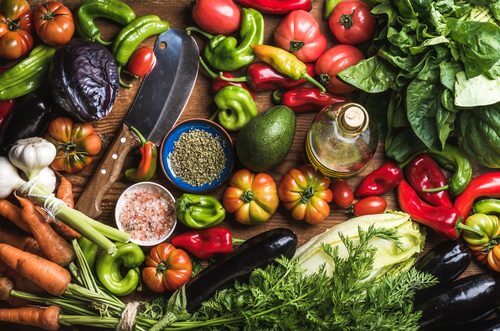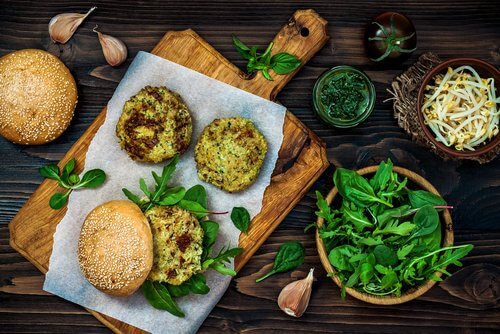9 Keys to Stop Eating Meat the Smart Way

People who decide to stop eating meat for whatever reason often suffer deficiencies when they change their diet. If not done correctly, it can have serious consequences for your health. You could become deficient in certain nutrients or even gain weight quickly. Here, we’ll give you keys to stop eating meat the smart way so that you can maintain a healthy, balanced diet.
Stop eating meat without risking your health
Becoming a vegetarian won’t necessary affect your health. However, this decision – which you may make for moral or health reasons – should make you more aware of what foods you eat and what nutrients you need. To stop eating meat is not the same as being 100% vegan.
- If you just give up meat but continue eating eggs, fish, or dairy, then you can make the change without any risks to your health
- Having said that, it’s always a good idea to follow the advice of a nutritionist

1. The wonderful virtues of eggs
Eggs are a very complete super food that perfectly fills in for any other animal protein. Years ago, we were told to not eat too many eggs. However, you can now even have them daily if you don’t have cholesterol problems. They’re especially good for people who don’t eat meat.
They’re an excellent source of protein and healthy fat. We recommend eating organic eggs. All you have to do is break open an organic egg and conventional one and you’ll see the difference.
2. Careful with the dairy
Many people who stop eating meat eat too many dairy products like milk and cheese. However, these foods are more harmful than you think. They increase your cholesterol levels and cause problems with your digestion. You can take advantage of all the vegetable milks in the stores now and combine them with more easily digestible dairy products like yogurt or ghee.
3. Risky flours
Another mistake that many of the people who give up meat make is the overuse of flour, whether in pizza, pasta, or sandwiches. This is because they’re fast and easy. However, this is not a good choice since they can make you gain weight quickly while providing your body with very little in terms of nutrition.
What you should eat more of is vegetables, salads, and vegetable juices in order to get enough vitamins, minerals, and fiber, which will help you feel satisfied.

4. Choose your fish well
If you don’t eat meat but do eat fish, we just recommend avoiding or limiting your consumption of large oily fish (salmon, tuna, swordfish), because they may contain high levels of heavy metals. These are potentially toxic for your health, especially for kids and pregnant women. However, you can eat small oily fish (sardines, mackerel) and white fish.
See also: 3 Easy and Delicious Fish Recipes
5. Other sources of calcium
Milk isn’t the only source of calcium out there, and many nutritionists aren’t even sure just how healthy it is. You can find good amounts of calcium in the following foods:
- Sesame seeds
- Seaweed
- Broccoli
- Almonds
6. Vitamin B12
A vitamin B12 deficiency is only a problem if you don’t eat any animal products. In this case, you should take a supplement.
This vitamin is also found in:
- Eggs
- Dairy
- Fish
- Seafood
7. Iron
Iron supplements should only be taken under medical supervision. If you don’t have iron-deficiency anemia, you can get enough of this mineral by eating the following foods:
- Spinach
- Nuts like pistachios
- Parsley
- Beets
- Lentils
- Brewer’s yeast
- Whole grains like oats
- Broccoli

8. Excellent vegetable protein
There are many plant-based foods that are high in protein:
- Nuts and seeds
- Legumes
- Whole grains like oats and quinoa
- Hemp
- Brewer’s yeast
- Spirulina
- Peas
9. Whole grains, nuts, and seeds
In your balanced, meat-free diet, you can’t go without whole grains. They are chock-full of nutrients and fiber. You shouldn’t forget about nuts (whether raw or toasted) and seeds, which can be sprouted to enhance their nutrition, as well.
All cited sources were thoroughly reviewed by our team to ensure their quality, reliability, currency, and validity. The bibliography of this article was considered reliable and of academic or scientific accuracy.
- Landi F, Calvani R, Tosato M, Martone AM, Ortolani E, Savera G, D’Angelo E, Sisto A, Marzetti E. Protein Intake and Muscle Health in Old Age: From Biological Plausibility to Clinical Evidence. Nutrients. 2016 May 14;8(5):295.
- Geiker NRW, Larsen ML, Dyerberg J, Stender S, Astrup A. Egg consumption, cardiovascular diseases and type 2 diabetes. Eur J Clin Nutr. 2018 Jan;72(1):44-56
- Aune D, Giovannucci E, Boffetta P, Fadnes LT, Keum N, Norat T, Greenwood DC, Riboli E, Vatten LJ, Tonstad S. Fruit and vegetable intake and the risk of cardiovascular disease, total cancer and all-cause mortality-a systematic review and dose-response meta-analysis of prospective studies. Int J Epidemiol. 2017 Jun 1;46(3):1029-1056.
This text is provided for informational purposes only and does not replace consultation with a professional. If in doubt, consult your specialist.








